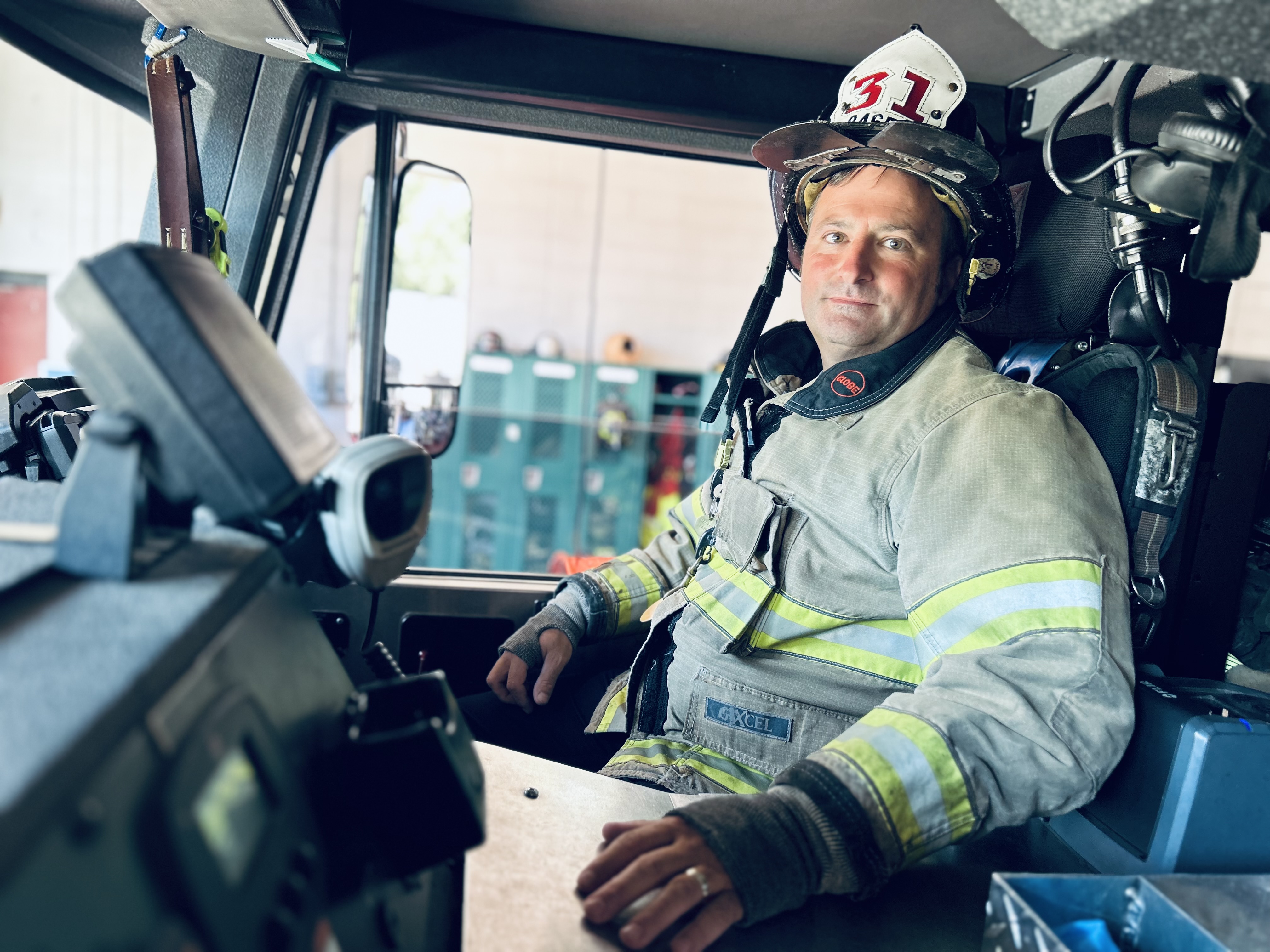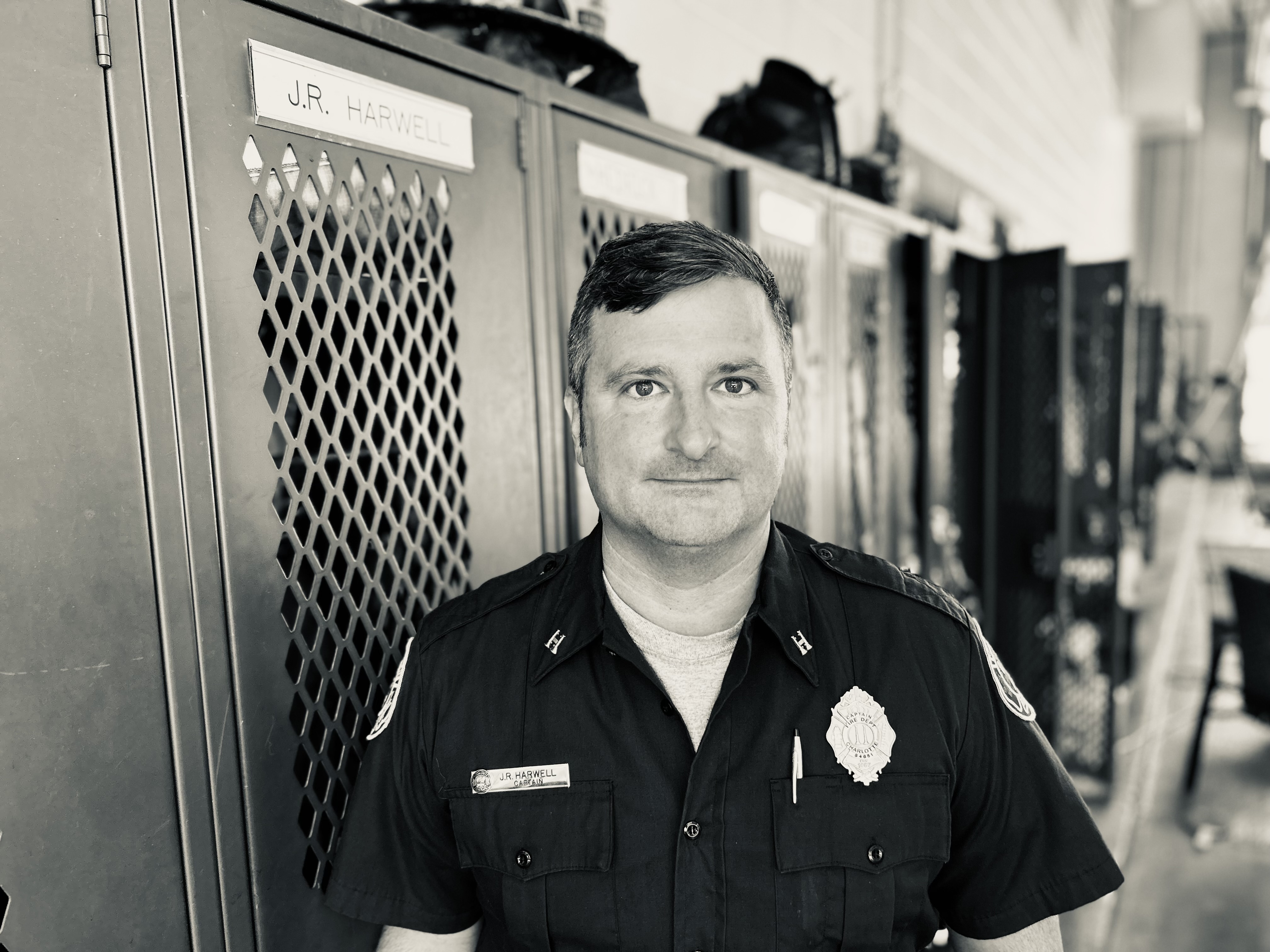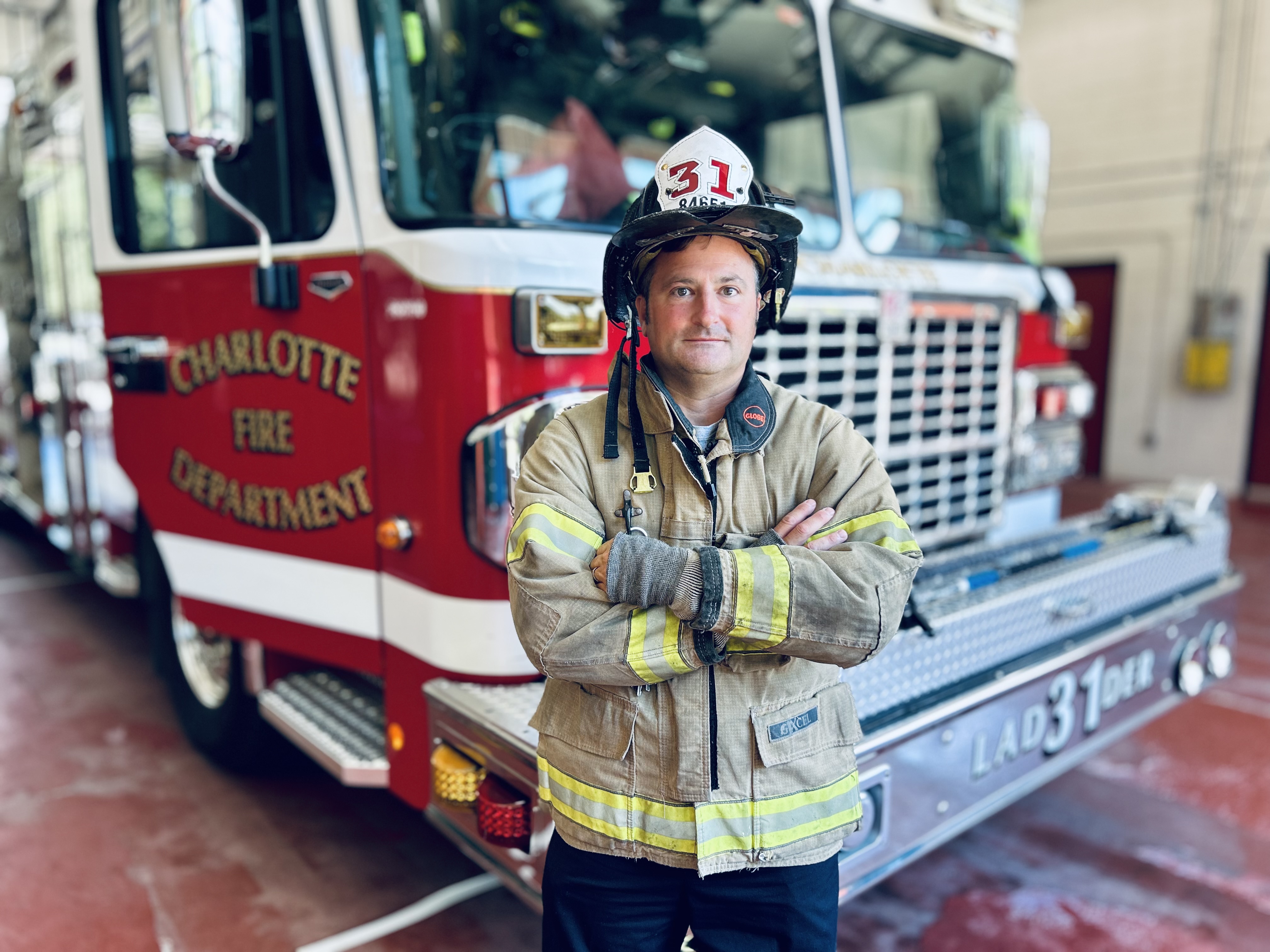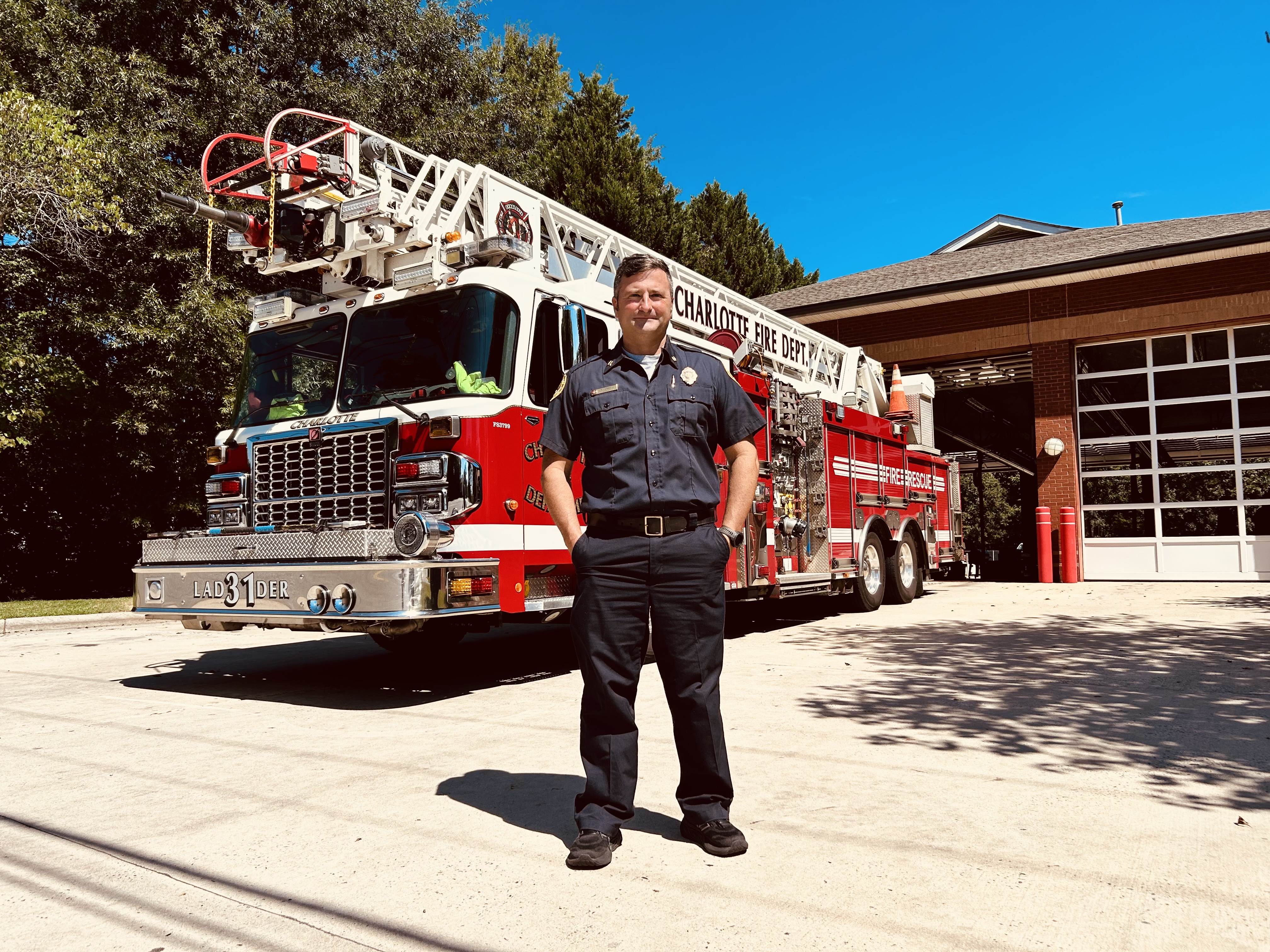Strength in the Firehouse: Support and Survival Through Cancer
Published on September 18, 2025

Capt. Russ Harwell stands in front of Ladder 31, carrying the pride of nearly 25 years of service and the strength that helped him overcome his fight with prostate cancer.
As a teenager working at a service station in Davidson, Harwell would sprint across the street to answer volunteer fire calls whenever the pager sounded. His boss, who also happened to be the assistant fire chief, encouraged him. “He let me run calls during the day,” Harwell remembered. “That’s what got me started.”

Wearing his traditional helmet, Capt. Harwell shows both his decades of service and the determination it took to move through his cancer journey.
That introduction eventually brought him to Charlotte Fire, where he was hired in February 2001. Nearly 25 years later, Harwell remains committed to the job he loves. “I’ve enjoyed every minute of it,” he said. “Good people, good work. It’s been a wonderful career.”
But in August 2023, Harwell faced a challenge that no training or fireground experience could prepare him for. He was diagnosed with prostate cancer at age 46.
It was a moment shaped by years of vigilance. Both of Harwell’s grandfathers had prostate cancer. Uncles on both sides of the family were diagnosed as well. His mother, a nurse, made sure he understood the risks. “She was always on me to watch it,” Harwell said. “When you get 40, you need to make sure.”

Capt. Harwell sits in the cab of Ladder 31, where countless emergencies have been answered, holding onto the sense of purpose that guided him through recovery.
Charlotte Fire’s annual physicals gave him a safety net. At 40, his PSA level measured 2.3, already considered high for his age. By June 2023, it had risen to 4.1. In July, it remained the same. An MRI showed nothing, but Harwell pressed for a biopsy. “I just wanted answers,” he said. “I wasn’t comfortable waiting around.”
The biopsy showed cancer in three of twelve tissue samples. His Gleason score, a system used to measure how aggressive prostate cancer can be, was six, a lower-risk category. His urologist suggested monitoring. Harwell wasn’t convinced. “I wanted another opinion,” he said.
Through family connections, Harwell was referred to Levine Cancer and met urology oncologist Dr. Smigelski. “He laid everything out for me, the pros and cons of each option,” Harwell said. The choices were clear: monitor the disease, try radiation seed therapy, or have surgery.

Capt. Harwell with members of Firehouse 31. They represent the continued support of his firehouse family.
For Harwell, it wasn’t really a choice at all. “I was 46. That’s young for prostate cancer,” he said. “I didn’t want to just leave it in there and hope for the best. I wanted to be done with it.”
In January 2024, he underwent a radical prostatectomy. Post-surgical results showed his cancer had been slightly more aggressive than first believed, upgraded to a Gleason 7. But his margins were clear. “They got it all,” Harwell said.
The road back wasn’t simple. He wore a catheter for seven weeks, much longer than the expected two. “The first six weeks weren’t terrible,” he said. “By the last week, I was ready for it to be out.” He faced bladder spasms, urinary urgency, and the frustration of setbacks that tested both body and mind.

Capt. Harwell stands beside his locker at Firehouse 31, a place that holds both the weight of daily duty and the quiet strength of his personal story.
Even tougher were the changes that affected his sense of identity. “It’s frustrating,” he admitted. “Especially the things they don’t always tell you about, like the erectile dysfunction. But I’ve had open conversations with my doctor, and that helps.”
His wife’s support became his anchor. “She looked at me and said, ‘Better or worse,’” Harwell recalled. “That meant everything. I hope if the roles were reversed, I’d be just as understanding.”
For a man used to carrying burdens, learning to lean on others was an adjustment. He reached out to fellow firefighters who had been through the same battle, including Firefighter Mark Meylor. “I wanted to know what they went through, what their decision-making process was,” Harwell said. “For me, talking about it helps. I can’t keep things bottled up.”

A quiet moment outside Firehouse 31, where Capt. Harwell’s story of service and survival continues to inspire open conversations about early detection
That willingness to speak openly came from his belief that information saves lives. “If someone hears my story and it helps them, that’s worth it,” he said.
At Firehouse 31, his fellow firefighters were constant sources of encouragement. When he went into surgery in January, they called his wife, sent messages, and checked in daily.
“They were great,” Harwell said. “They asked what I needed, they showed up. Sometimes you tell people, yeah, bring some food by, not because you need it, but because it makes them feel better too. That support meant a lot.”

In full gear before Ladder 31, Capt. Harwell stands ready for the job he loves, a reminder that cancer did not take him away from his calling.
What surprised Harwell most was how fast it all happened. “From June to August, we figured out I had it. By October, I was talking to the oncologist. By January, I was in surgery,” he said.
By spring 2024, his PSA levels were undetectable. He now returns for checkups every six months, but so far all results have been positive.
He admits the thought of recurrence lingers. “There’s always that thought in the back of your mind, will it come back? But you can’t let it consume you,” he said. “I’ve got daughters I want to be here for, so you just keep moving forward.”

Harwell’s turnout coat and helmet rest across Ladder 31’s bumper, symbols of the battles fought both on the fireground and in his personal fight with cancer.
Charlotte Fire Chief Reginald Johnson praised Harwell for his openness. “Capt. Harwell’s strength and honesty show what it means to be a firefighter,” Chief Johnson said. “By sharing his story, he’s helping others understand the importance of early detection and proving that no one in Charlotte Fire faces cancer alone.”
Harwell hopes other firefighters take advantage of the resources available to them. “If it wasn’t for the physicals we get here, who knows how long it would have gone before I found out,” he said. “Nobody likes going through those tests, but they might save your life.”

Capt. Harwell with fellow firefighters from Ladder 31. They embody the spirit of encouragement that has surrounded him.
For him, openness and honesty are the best tools. “Talking to people, learning from others, that’s what helped me most,” Harwell said. “I’ll tell anyone every step I took and why I made those decisions. Keeping it bottled up will drive you crazy.”
He still thinks back to the long days at home during recovery, the boredom, the doubts, the frustration. But then he remembers the people who stood with him — family, firefighters, doctors, and friends. “I’ve always felt this job was a family,” Harwell said. “But going through cancer, that really came through. People check in, they step up. That makes all the difference.”

Capt. Harwell outside Firehouse 31 with Ladder 31 behind him, showing his resilience as both a firefighter and a survivor.
Editor’s note: Facing the Fire Within is a four-part series sharing the personal stories of Charlotte Firefighters diagnosed with prostate cancer. The series aims to raise awareness, encourage early detection, and ensure no firefighter faces this battle alone.
Read more about what Charlotte Fire is doing to fight cancer in our department-wide overview: FIRE'S PUSH TO BEAT CANCER